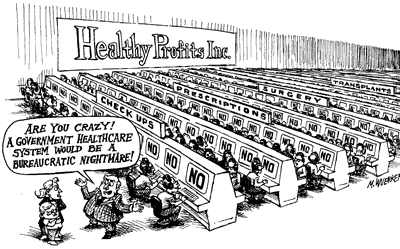- Community
-
Programs
- Schools
-
Careers
- RN Specialties
- Best RN Jobs and Salaries
- Aesthetic Nurse
- Nursing Informatics
- Nurse Case Manager
- NICU Nurse
- Forensic Nurse
- Labor and Delivery Nurse
- Psychiatric Nurse
- Pediatric Nurse
- Travel Nurse
- Telemetry Nurse
- Dermatology Nurse
- Nurse Practitioner
- Best NP Jobs and Salaries
- Family NP (FNP)
- Pediatric NP
- Neonatal NP
- Oncology NP
- Acute Care NP
- Aesthetic NP
- Women's Health NP
- Adult-Gerontology NP
- Orthopedic NP
- Emergency NP
- Psychiatric-Mental Health NP (PMHNP)
- APRN
- Nurse Educator
- Nurse Administrator
- Certified Nurse Midwife (CNM)
- Clinical Nurse Specialist (CNS)
- Certified Registered Nurse Anesthetist (CRNA)
- Resources
- Education


ZASHAGALKA, RN
3,322 Posts
Somewhere between a free market system and socialized medicine is what we have now. . .
It's not a matter of taking the profit out of the system as much as it is a matter of putting back into the system cost accountability. There is no free market competition in healthcare because the system is built on and by third party payors that don't care what the ultimate consumer thinks. Return to a free market and, with unfettered competition, profit falls to its smallest possible margin in order to sell you a product you want, at a price you are willing to pay.
The free market works, but only when the gov't butts out. When the gov't puts its hands on the scale, you get what we have now. The gov't placing an even larger hand on the scale is not the solution. The solution is to remove the hand already in place.
~faith,
Timothy.